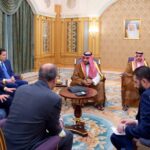
Donald Trump’s just-concluded Middle East visit produced considerable press coverage for the business deals and investments he and his counterparts announced. The visit’s biggest news, however, was his declaration that the United States would lift economic sanctions on Syria imposed during the Assad regime. Trump said in Riyadh(https://www.reuters.com/world/trump-starts-gulf-visit-seeking-big-economic-deals-2025-05-13/), “Oh what I do for the crown prince [Mohammed bin Salman].”
Syria’s new leader, Ahmed al-Sharaa, even received a brief meeting with Trump in Riyadh(https://www.cnn.com/2025/05/14/middleeast/syria-trump-meeting-analysis-intl). In 2013, America had named(https://2009-2017.state.gov/r/pa/prs/ps/2013/05/209499.htm) Al-Sharaa, under his nom de guerre Mohammed al-Jawlani, a “specially designated global terrorist,” and put a $10 million bounty on his head. The US had previously listed his terrorist group, Hay’at Tahrir al-Sham, once known as the Al Nusrah Front, an Al Qaeda affiliate, as a foreign terrorist organization.
American presidents don’t normally meet with terrorists, but al-Sharaa obviously received good public-relations advice after taking power: he abandoned his nom de guerre, trimmed his beard, and traded his combat fatigues for a suit and tie, looking more like a businessman than a terrorist. But have Al Sharaa and HTS truly renounced terrorism?
Trump didn’t wait to find out. To be sure, Trump advised al-Sharaa during their meeting to sign an Abraham Accord recognizing Israel, expel foreign terrorist fighters from Syria, and join the fight against ISIS. But Al-Sharaa made no apparent commitment to do so, certainly not publicly. This is hardly “the art of the deal” at its finest.
Saudi Arabia’s interests, and those of the broader Arab world, in accepting al-Sharaa’s new government are clear. Assad’s fall was a massive defeat for Iran, losing its most important regional ally and cutting off land supply routes to Hezbollah, Iran’s principal terrorist proxy. Moving to restrict Turkish President Erdogan’s influence in Syria was also important, since HTS could not have overthrown Assad without Ankara’s considerable assistance.
Defeating Tehran’s mullahs and restraining Erdogan’s neo-Ottoman influence in Syria and the Middle East generally are also in America’s interest. But these objectives are not enough. Washington needs more than rhetoric from al-Sharaa, it needs performance of concrete actions proving he has abandoned terrorism in fact not just in talk. Trump let the moment slip when he should have insisted on America’s conditions to lift sanctions, but the designations of al-Sharaa and HTS as terrorists, and Syria’s Assad-era designation as a state sponsor of terrorism remain in effect. These listings should not be rescinded unless and until al-Sharaa’s regime meets several further conditions, enumerated below. Moreover, if it fails to do so promptly, sanctions should be reimposed.
Most importantly, al-Sharaa must permanently reverse Assad policies that led to Syria’s ostracization, and be completely transparent with the Assad’s government’s archives and related materials. Since non-terrorist governments do not take hostages, al-Sharaa should open Syria’s government records to international review on all aspects of foreign hostages seized over the past decades. For the hostage families’ sake, their stories must be told fully, and any Syrian links with foreign entities assisting the hostage-taking must be disclosed to law-enforcement agencies for appropriate follow-up.
There must also be a clean break from all Assad regime efforts in chemical, biological and nuclear weapons, particularly ties with governments like Iran. After Assad’s fall, Israel reportedly bombed suspected chemical-weapons facilities, but al-Sharaa should nonetheless identify all chemical-weapons-related sites in Syria, and open these locations and government files to inspection either by Washington or the Organization for the Prohibition of Chemical Weapons. Comparable steps need to be taken regarding biological weapons.
Syria’s nuclear activities likely centered on the nuclear reactor, which it aided Iran and North Korea in building at Deir al-Zour. Syrian records on Deir al-Zour and other links with Iran could prove invaluable in countering Tehran’s regional threat. Syria should take every step to preserve this evidence and make it available for international review. Al-Sharaa should also abandon support for Iran’s efforts to dominate Lebanon through Hezbollah.
Moreover, if al-Sharaa has indeed renounced terrorism, he needs to fully disclose Al Nusrah’s funders over the years. He should commit to working with the Kurds, particularly the Syrian Democratic Forces, in securely confining their thousands of ISIS prisoners. Other terrorists in Syria should be imprisoned there, not expelled, as Trump suggested, possibly to return to terrorism elsewhere. Signs of possible Turkish reconciliation with its own Kurdish citizens do not prove that Erdogan’s neo-Ottoman ambitions regarding Kurdish-populated areas in Syria and elsewhere have diminished. Accordingly, US forces need to remain in northeastern Syria until HTS’s good faith is fully proven.
Finally, Syria should expel Russia from its naval station at Tartus and air base at nearby Hmeimim. Russia’s 2022 unprovoked aggression against Ukraine, not to mention its long-time support for Assad, prove how dangerous an extensive Russian military presence in Syria is
In short, Al-Sharaa has a long way to go before he and his HTS regime deserve full recognition and legitimacy from the United States. This “deal” is not yet done.
This article was first published in The Independent Arabia on May 19, 2025. Click here to read the original article.